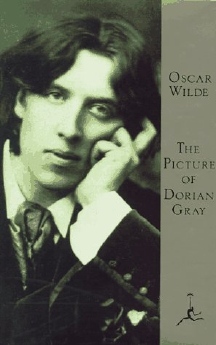 |
 Oscar Wilde
Oscar Wilde
The Picture of Dorian Gray
Reviewed by: Terry Weyna © 2006
Modern Library
US Hardcover Reprint Edition
ISBN 0-679-60001-9
Publication Date: 09-05-1992
272 Pages; $15.95
Date Reviewed: 07-17-06
Index:
General Fiction
Horror
Every now and then it's a great pleasure to get back to the classics. I usually dread picking up something I should have read a long time ago but haven't; I'm sure it's going to be dry and dense and have me counting how many more pages I must read until I finish. You'd think that, as a former English major, I'd know better, but I'm always surprised when it turns out that the classic I'm reading is fresh, exciting, and much better than the movie version I saw years ago.
I've known the story of one of the first classics of the horror genre, 'The Picture of Dorian Gray' by Oscar Wilde, for as long as I can remember, but until now I've never read the book, first published in 1891. I don't know what called it to mind; most likely some off-hand remark in an introduction to another book. Whatever it was, I'm grateful for the impulse, because now I remember why classics are classics: it's because they're enduringly excellent.
Dorian Gray isn't written like many plot or character-drive contemporary novels. To the contrary, this is a philosophical novel buttressed with such intense, florid, very nearly over-written descriptive passages that one can almost smell the flowers and feel the heat, see the beauty of Sybil Vane (Gray's first love) and admire the handsome face of Gray. You won't find strong passages detailing the horrors of the life that Dorian Gray chooses to live, though you will find long, striking descriptions of his various collections, from textiles to jewels. His treatment of women — and young men — is understood only because we learn that they commit suicide, or cannot be seen in polite society any longer, or have their children taken from them.
Gray's malign influence, Lord Henry Wotton, is so full of very bad advice that one can at first hardly understand how even a callow youth like Gray is when we first see him could possibly fall within his spell. But Wotton's cynicism is so complete, so dark, and yet so beautifully, persuasively stated, in words that are so precisely chosen, that Gray's fascination with him, and with the libertinism that he preaches (though he does not appear to live it) becomes obvious. Wotton triumphs in his corruption of Gray, sees Gray as a social experiment He hastens Gray's downfall by lending him a certain book, a book that fascinates him (though he does not like it — the first time he understands that distinction — a book so apparently full of evil that it may as well be the Necronomicon.
And always, lurking in Gray's mind, is his portrait. He first learns of its properties when he rejects Sybil Vane for the horrific sin of playing Juliet badly in a single performance of Shakespeare's Romeo and Juliet, when the first lines of cruelty start to appear around the mouth of the man portrayed there. He locks it up in a room high above his home's living spaces, making sure that no one else has access to the room, and even then makes certain that it is covered by a rich, beautiful covering except on those occasions when he wishes to castigate himself, luxuriating in the state of his soul, by sitting before it and contemplating its growing hideousness.
This short masterpiece will intrigue and fascinate you in ways you can't expect after reading the likes of Clive Barker, Stephen King and Peter Straub — all authors I enjoy and admire greatly, but none of whom could be accused of subtlety. Wilde writes with such fervor, with such beauty, that this book becomes difficult to put down. This is not a book to put away with the schoolbooks when we graduate from high school, but a book to be read, reread and cherished at different stages in our lives. It makes us look at ourselves in the mirror — including the mirror of this novel — quite differently.
|
 |
